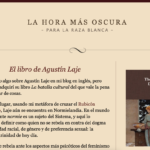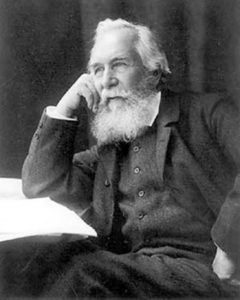Month: July 2022
One of the most serious objections lodged against the interpretation of Hitler as a pantheist is his use of the term “Creator” in his writings and speeches. Hitler occasionally referred to an Almighty Creator or Eternal Creator, and he sometimes asserted humans were made in the image of God. If Hitler believed in a God who created nature as a distinct entity, separate from himself as deity—as monotheistic religions have traditionally taught—then he would not be a pantheist. He would most likely be a deist, since he generally spurned the idea that God intervened miraculously in history.
In his speech to the 1935 Nuremberg Party Congress, Hitler called God “the Creator” of the German Volk. However, he also implied that God would not intervene miraculously on behalf of his chosen people. They would have to work and fight to gain the Almighty’s favor and blessing. Hitler stated, “In the long run God’s favor will be given only to him who deserves it. He who speaks and acts in the name of a people created by the Almighty continues to act under this commission so long as he does not sin against the substance and the future of the work of the Creator that has been placed in his hand. Therefore it is good that the conquest of power is always bound up with hard fighting.” Hitler’s God was not one who intervened super-naturally in historical developments. Rather, he rewarded people according to the way they worked and fought. God did not break into the cause and effect relationship governed by natural law.
In January 1943, Hitler again called God “Creator” yet implied this version was not a miracle-working deity; rather, he expected humans to make their own way in the world… “In this mightiest struggle of all time, we cannot expect that Providence give us victory as a present. Each and every people will be weighed, and what is judged too light will fall.”
______ 卐 ______
Editor’s note: If this is true, and I believe it is, American white nationalism will fall: it is too timid an intellectual movement.
______ 卐 ______
God’s judgment is thus not a decision of a personal deity but the result of natural causation: those who work hard and fight bravely win. It is also interesting to note that, according to this speech, one of the things Hitler’s God established was the Darwinian law of the struggle for existence…
Hitler explicitly rejected the creation stories of the Judeo-Christian tradition. Finally, Hitler embraced an evolutionary account of the origins of humanity.
Let’s explore these last two points in greater depth. Never did Hitler express belief in the biblical creation story—which, after all, derived from the Jewish scriptures. (We have already seen that Hitler’s anti-Semitism led him to spurn the Old Testament as a Jewish document.) He obviously did not embrace young-earth creationism (which is what most Americans mean today when they use the term creationism), since on quite a few occasions he mentioned the earth existing for hundreds of thousands, or even millions, of years. For example, in Mein Kampf, he warned pacifists that their naiveté would have disastrous consequences, because “this planet once moved through the ether for millions of years without human beings and it can do so again some day if men forget that they owe their higher existence, not to the ideas of a few crazy ideologists, but to the knowledge and ruthless application of Nature’s stern and rigid laws”…
In general, Hitler regarded the Old Testament creation stories as delusional inventions of the Jewish mind. On October 24, 1941, Hitler spoke at great length to his entourage about the controversy between science and religion, and specifically between evolution and Christianity. Hitler opened this lengthy monologue on evolution by claiming that the church’s teachings are contrary to modern research. In fact, as Hitler expounded on this science-religion controversy, he clearly came down on the side of science and bashed the church, asserting, “The definition of the church is a misuse of the creation for earthly purposes.” He also divulged his pantheistic tendencies: “Whoever sees God only in an oak or in a tabernacle and not in the Whole, cannot be pious deep inside; he remains stuck in the outward.” In addition, Hitler praised the French Enlightenment thinkers’ anticlericalism and the progress of science. After expostulating on the glories of science and the ignorance of the church, Hitler pronounced his belief in the evolution of humans. He stated, “There have been humans at the rank at least of a baboon in any case for 300,000 years at least. The ape is distinguished from the lowest human less than such a human is from a thinker like, for example, Schopenhauer”…
______ 卐 ______
Editor’s note: Just what I meant in my previous post, ‘On the hermit’s cave’.
______ 卐 ______
[Hitler’s secretary Christa] Schroeder confirmed in considerable detail that Hitler believed in human evolution through the process of struggle and selection. Two other associates of Hitler testify that belief in Darwinian evolution was integral to his ideology. Wagener remembered a conversation in the summer of 1931 when Hitler professed, “Everywhere in life only a process of selection can prevail. Among the animals, among plants, wherever observations have been made, basically the stronger, the better survives”.
______ 卐 ______
Editor’s note: And the Jews are proving to be stronger than the Aryans because of the Christian malware in the latter’s head, the parasite that weakened them (compare today’s Aryans with what Flavian dynasty member Titus did in Jerusalem).
______ 卐 ______
This not only demonstrates Hitler believed in Darwinian natural selection, but it also suggests he saw the process as nonteleological, i.e., not directed by some deity. Wagener claimed that Hitler based his support for killing the weak and the sick on this vision of natural selection. Otto Dietrich generally concurred, stating that Hitler’s “evolutionary views on natural selection and survival of the fittest coincided with the ideas of Darwin and Haeckel.” Hitler was not an atheist, according to Dietrich, but believed in a Supreme Being who “had created laws for the preservation and evolution of the human race. He believed that the highest aim of mankind was to survive for the achievement of progress and perfection.” Thus, evolutionary thought was central to Hitler’s goals and policies.
In his two books, Hitler discussed evolutionary theory as vital to his theory of racial struggle and eugenics. Several times throughout Mein Kampf, he specifically employs the term “struggle for existence” (“Kampf um das Dasein”); in fact, the phrase or its plural appears three times in a passage several pages long where Hitler described why the Germans should be both pro-natalist and expansionist. Historian Robert Richards, however, inexplicably claims that Hitler’s views in this passage are un-Darwinian, because—according to Richards—a Darwinian should supposedly want population expansion only within restricted borders, which would allow the fit to triumph over the unfit. Richards argues expanding into new territory would lessen the struggle, allowing the fit and less fit “to have fairly equal chances.”
Richards, however, miscalculates here because he leaves out one of the most important factors in Hitler’s reasoning: the living space (Lebensraum) is to be taken from allegedly inferior races. Thus, expanding is part of the Darwinian racial struggle that allows the allegedly fitter Nordic race to outcompete allegedly inferior races. Contra Richards, Hitler’s discussion makes perfect sense in a Darwinian world if unequal races are waging a struggle for existence. In fact, the whole idea of Lebensraum was first formulated by Friedrich Ratzel, a Darwinian biologist who later became a geographer. In addition, many pro-natalist eugenicists with impeccable Darwinian credentials, such as Alfred Ploetz or Max von Gruber, agreed with Hitler’s position on expansionism (indeed, they may have influenced Hitler in this matter).
______ 卐 ______
 Editor’s note: On the following pages (231-236) of Hitler’s Religion, pages containing a very important quotation from Hitler’s second book, we see that Hitler understood Darwinism perfectly.
Editor’s note: On the following pages (231-236) of Hitler’s Religion, pages containing a very important quotation from Hitler’s second book, we see that Hitler understood Darwinism perfectly.
The point is that this Darwinism will lead us to our exterminationist philosophy (remember what Darwin himself believed would be the fate of coloured people). Weikart continues:
______ 卐 ______
In June 1944, Hitler explained his views on war to an audience of army officers in a remarkably candid speech. He opened it by basing his philosophy of war on natural law:
“Among the processes that are essentially immutable, that remain the same throughout all time, and that only change in the form of the means applied, is war. Nature teaches us with every gaze into its workings, into its events, that the principle of selection dominates it, that the stronger remains victor and the weaker succumbs. It teaches us that what often appears to someone as cruelty, because he himself is affected or because through his education he has turned away from the laws of nature, is in reality necessary, in order to bring about a higher evolution of living organisms”.
Hitler then insisted that humans must follow the ways of nature, not the allegedly misguided path of humanitarians. If they pursue humanitarianism, Hitler warned, they will be supplanted by other organisms that take the struggle seriously.
______ 卐 ______
Editor’s note: Instead of ‘humanitarians’ or ‘humanitarianism’, the Christian author of this book didn’t dare to write simply ‘Christians’ or ‘Christianity’. If the ancient Romans would have had weapons of mass destruction and survived the next centuries instead of succumbing to Christianity, we can already imagine the fate of the Huns, the nascent Muslims or the Mongol invaders.
______ 卐 ______
As I have demonstrated above, Hitler did indeed believe in human evolution. It was not a peripheral element of his worldview, either. It helped shape his understanding of the human struggle for existence, natural selection among humans and human races, eugenics, pronatalism, killing the disabled, and expansionism. Of course, Hitler’s evolutionary views were synthesized with many other influences, such as anti-Semitism and nationalism; it was by no means the sole influence on his ideology or policies.
But in addition to all the times Hitler explicitly broached the topic of human evolution, he even more frequently discussed the racial struggle for existence, the struggle for existence within the Nordic race, natural selection, and many other Darwinian themes. He often abbreviated these terms as “racial struggle,” “struggle,” and “selection,” just as many of his contemporaries, including biologists and eugenicists, did, but key issue here is the concept, not the exact terminology. When Hitler spoke about the “selection” of the strongest organisms and the elimination of the weakest, it did not matter whether he used the exact term “natural selection” (though he did at times). He was obviously describing it, and that is the crucial issue…
“The ape is distinguished from the lowest human less than such a human is from a thinker like, for example, Schopenhauer.” In a 1933 speech at the Nuremberg Party Rally, he stated, “The gulf between the lowest creature which can still be styled man and our highest races is greater than that between the lowest type of man and the highest ape.” These last two comments paraphrase statements Haeckel made in many of his works; two examples are “the difference between the lowest primitive humans and the highest evolved cultured humans is in this respect greater than that between the former and the apes” and “the differences between the highest and the lowest humans is greater than that between the lowest human and the highest animal.”
______ 卐 ______
Editor’s note: Emphasis in the original. I hope that by now you understand my iterated statement on this site about “the extermination of the Neanderthals”: something I have been telling myself for decades in the cave but only in recent years dared to divulge.
______ 卐 ______
Hitler asserts, “Nature knows no political boundaries. First, she puts living creatures on this globe and watches the free play of forces. She then confers the master’s right on her favorite child, the strongest in courage and industry.” In other words, nature is the source of living organisms—not some Creator God—and lets these organisms fight it out among themselves. Nature is not actively intervening or doing miracles but rather allowing its laws to prevail.
On this site, I have been using the metaphor of the three-eyed raven’s cave in the sense that for a real intrapsychic metamorphosis it is necessary to cut oneself off from human society for decades. Even Hitler once fantasised about becoming a Benedictine monk. A Trappist monk (my father, by the way, loved some Trappist monks he met in Spain in Franco’s time), Thomas Merton, wrote something that portrays what I have come to know precisely by going into that cave for most of my life:
"The world of men has forgotten the joys of silence, the peace of solitude which is necessary, to some extent, for the fullness of human living. Not all men are called to be hermits, but all men need enough silence and solitude in their lives to enable the deep inner voice of their own true self to be heard at least occasionally. When that inner voice is not heard, when man cannot attain to the spiritual peace that comes from being perfectly at one with his own true self, his life is always miserable and exhausting. For he cannot go on happily for long unless he is in contact with the springs of spiritual life which are hidden in the depths of his own soul. If man is constantly exiled from his own home, locked out of his own spiritual solitude, he ceases to be a true person. He no longer lives as a man. He becomes a kind of automaton, living without joy because he has lost his spontaneity. He is no longer moved from within, but only from outside himself".
Naturally, Hitler and I would object to Merton and the young Americans who wanted to emulate him after World War II that true wisdom is not to be gained in Catholic hermitages, but in pagan caves where the magic of the old religions allows us to see the historical past as it happened (the metaphor of the third-eyed raven). If the young men who wanted to emulate Merton had opened their third eye, they would have realised that they fought on the wrong side in WW2 (just imagine seeing the Hellstorm atrocities with your own eyes!).
Nevertheless, what Merton says about the solitude of the hermit is true.
Only by separating ourselves from our fellow human beings to develop the inner self is it possible to understand what is going on. Alas, no normie or racialist today, as far as I know, has gone through the initiatory process that Hitler went through so well, as explained in the book we recently translated for this site by Savitri Devi.
Other sites
 Almost a month ago the old incarnation of this site was censored by WordPress, Inc., which hosted it. Although the technicians have helped me with the migration, there are things I have to do manually. For example, I have six other sites on WordPress. After last month’s censorship, I will no longer be posting on those other sites. However, I am still busy backing up the information of those sites.
Almost a month ago the old incarnation of this site was censored by WordPress, Inc., which hosted it. Although the technicians have helped me with the migration, there are things I have to do manually. For example, I have six other sites on WordPress. After last month’s censorship, I will no longer be posting on those other sites. However, I am still busy backing up the information of those sites.
In English:
Ex libris
The medieval Turin Shroud
In Spanish:
La hora más oscura
Hojas eliminadas
Anti-psiquiatría
Escatología
I hope that by Friday, one month after the censorship, I will have finished all this backup so that my intellectual work on those other sites won’t be lost in case WordPress decides to take down them as well.
Editor’s Note: We will now read excerpts from ‘Who was Hitler’s Lord?’, the eighth chapter of Hitler’s Religion by Richard Weikart:
______ 卐 ______
One of the most famous quotations from Hitler’s Mein Kampf is, “Hence today I believe that I am acting in accordance with the will of the Almighty Creator: by defending myself against the Jew, I am fighting for the work of the Lord.” Some construe this to mean Hitler believed in the Christian God and saw his war fighting against Jews as part of a religious battle that had been waged for centuries. Even though Hitler did not overtly appeal to Christianity in this statement, his use of the terms “Almighty Creator” and “Lord” would have been understood by many of his contemporaries (and those who currently ignore Hitler’s many anti-Christian utterances) as the Christian God. Anti-Semites in the Catholic or Protestant churches would have applauded him for doing “the work of the Lord.”
Nonetheless, there are major problems with suggesting that this statement indicates Hitler’s Lord was the Christian God. The aim of Hitler’s anti-Semitism—the “Lord’s work” he thought he was doing—was radically different from the goal of traditional Christian anti-Semitism (as mentioned in chapter six). The context itself suggests Hitler had some other kind of God in mind. Hitler was fulminating against the “Jewish doctrine of Marxism,” which he thought “rejects the aristocratic principle of Nature.” In the sentence immediately preceding his famous quotation about doing the work of the Lord, Hitler stated, “Eternal Nature inexorably avenges the infringement of her commands.” Four important points emerge from this. First, Hitler personified nature in this passage, ascribing to it characteristics that would normally be associated with God. Second, Hitler called nature eternal. If he thought nature existed forever, as this statement indicated, then the God he believed in could not have created nature sometime in the past. Thus Hitler’s God was not even a deistic, much less a theistic, God. The “Almighty Creator” he mentioned in the following sentence could not have created nature, making it highly probable that Hitler’s “Creator” was nature. Third, Hitler believed that nature’s commands defined morality, since he claimed nature issues commands…
Thus, the “Lord” on whose behalf Hitler was fighting the Jews was none other than nature deified. Samuel Koehne seems to agree with this interpretation, stating in a recent article, “At times he [Hitler] conflated this ‘divine will’ and ‘Nature,’ or the ‘commands’ of ‘Eternal Nature’ and the ‘will of the Almighty Creator.’” When Hitler called nature eternal in Mein Kampf, this was not just a slip of the pen (or typewriter). He referred to nature as eternal on several occasions throughout his career…
I am not, of course, the first person to conclude Hitler was a pantheist. In 1935, a religious commentator George Shuster placed the dominant German religious beliefs in the 1930s into five categories: Catholicism, Lutheranism, Judaism, neo-pantheism, and negativity toward religion. Though Hitler was influenced by the first two, his deepest cravings evinced pantheism, according to Shuster. Pius XI did not specifically mention Hitler in his encyclical Mit brennender Sorge, but he did combat therein the “pantheistic confusion” he saw in Nazi ideology. Shortly after World War II, the German theologian Walter Künneth interpreted Hitler’s religion as a form of apostasy from Christianity. He argued that when Hitler used terms like God, Almighty, and Creator, as he was wont to do, he redefined these terms in a pantheistic direction. Künneth stated, “In proper translation Hitler meant by ‘Creator’ the ‘eternal nature,’ by ‘Almighty’ and ‘Providence’ he meant the lawfulness of life, and by the ‘will of the Lord’ he meant the duty of people to submit themselves to the demands of the race.”
Robert Pois argues not only that Nazism advocated a religion of nature, but that it was central to the Nazi project. Their “religion was one which could and did serve to rationalize mass-murder,” he asserts. He only spends a few pages discussing Hitler’s own religious views, but he does portray Hitler as a pantheist who exalted “pitiless natural laws” above humanity. “What Hitler had done,” according to Pois, “was to wed a putatively scientific view of the universe to a form of pantheistic mysticism presumably congruent with adherence to ‘natural laws.’” In Pois’s view, Hitler’s pantheistic perspective was part of the Nazi revolt against the Christian faith and its values. Hitler “had virtually deified nature and he most assuredly identified God (or Providence) with it.” Pois might overstate the role played by the “religion of nature” in the Nazi Party, but he does demonstrate that it was not uncommon. André Mineau argues that the SS was inclined toward pantheism, stating, “The SS view of religion was a form of naturalistic pantheism that had integrated the biological paradigm.”
A number of other scholars who have analyzed Hitler’s religion concur it was pantheistic… Thomas Schirrmacher, in the most extensive and thorough analysis of Hitler’s religion to date, emphasizes the anti-Christian character of Hitler’s theology. However, Schirrmacher interprets Hitler as a non-Christian monotheist, specifically rejecting the idea that Hitler was a pantheist or deist. Oddly, however, Schirrmacher admits Hitler used the terms God, Almighty, and Creator synonymously with the rule of nature and the laws of nature.
Before I explain Hitler’s pantheistic religion in greater depth, it is important to understand that pantheism was an influential religious perspective in German-speaking lands (and elsewhere in Europe) before and during Hitler’s time. By the early twentieth century, two forms of pantheism had emerged, which I will call mystical pantheism and scientific pantheism. Mystical pantheists believed that the cosmos had a mind or will that was supreme, while scientific pantheists stressed determinism, i.e., the strict rule of natural laws. According to scientific pantheism, the laws of nature are an expression of the will of God and thus inescapable and ironclad. Mystical pantheism disagreed with this view, denying that science could fathom the mind of the universe. Mystical pantheism sometimes had affinities or even overlapped with animism, polytheistic nature-gods, or occultism. Scientific pantheism, on the other hand, shared similarities with atheism…
______ 卐 ______
Editor’s note
This is central to understanding what I call the religion of holy words, and only those philosophers who have speculated in astrophysical mysteries, as Roger Penrose has done, would understand anything. I mean how the beauty of the alphabet with which God created the universe (mathematics), to quote Galileo, is related to the beauty of Nature and the Aryan race in particular.
To defend Aryan beauty is to defend the emerging God that is being born with the pure, unpolluted Aryans, as can also be seen in this new series of images on European beauty that I have started in the new incarnation of this site. He who doesn’t feel beauty to the extent of wanting to preserve it, has not been initiated into the mysteries of our religion.
Weikart continues:
______ 卐 ______
Some forms of anti-Semitism in the late nineteenth century favored pantheism as an antidote to the supposedly Jewish features of monotheism. For instance, Eduard von Hartmann, who is sometimes regarded as a forerunner of Freud because of his philosophizing about the unconscious, promoted pantheism as a replacement for Christianity in 1874. He believed Christianity was in its death throes. Hartmann was a popularizer of Schopenhauer’s philosophy, though he blended it with Schelling’s pantheism. Hartmann praised pantheism as the original religion of the Aryans, while denigrating monotheism as an inferior Semitic religion…
 (The NS regime honored the German Darwinian biologist and pantheist Ernst Haeckel by including his portrait in the 1936 “Exhibition of Great Germans” in Berlin.)
(The NS regime honored the German Darwinian biologist and pantheist Ernst Haeckel by including his portrait in the 1936 “Exhibition of Great Germans” in Berlin.)
Another early twentieth-century figure who shared many affinities with Hitler’s religious views was Hans F. K. Günther, whom Hitler admired for his writings on Nordic racism. Hitler was so enthusiastic about Günther’s work that he pressed Wilhelm Frick to appoint him to a professorship in social anthropology at the University of Jena in 1930, and Hitler attended his inaugural lecture. When Hitler instituted a Nazi Party Prize for Art and Science at the 1935 Nuremberg Party Rally, he bestowed the first prize for science on Günther. In 1934, Günther discussed Nordic religion in his book Piety of a Nordic Kind. (The copy of this book that I examined was owned by the Adolf Hitler School, an elite Nazi educational institution, so, clearly the Nazis approved of this work.) In this book, Günther examined the religiosity of the Indo-Germanic people, not the specific content of their religions, yet he admitted that pantheism or some kind of mysticism is more compatible with Nordic religious inclinations than theism is. Like Hitler, he believed that the world is eternal, and he dismissed as an “Eastern” invention the idea that God created the world (“Eastern” likely meant Jewish in this context—it clearly was not referring to South or East Asian religions.) He also denied body-soul dualism, the need for redemption, and the existence of an afterlife, claiming instead that true religion should focus on this world…
Martin Bormann’s outspoken pantheistic views also seem similar to Hitler’s religion, and though he probably did not influence Hitler, he was able to disseminate his views to other Nazi Party leaders. In June 1941, Bormann, the head of the Nazi Party apparatus and one of the most powerful figures in the final four years of the Third Reich, issued a statement on the relationship between National Socialism and Christianity to all the Gauleiter. He told them that Nazis do not understand God as a human-like being sitting somewhere in the cosmos, but rather as the vastness of the universe itself. He continued,
“The force which moves all these bodies in the universe, in accordance with natural law, is what we call the Almighty or God. The assertion that this world-force can worry about the fate of every individual, every bacillus on earth, and that it can be influenced by so-called prayer or other astonishing things, is based either on a suitable dose of naiveté or on outright commercial effrontery.”
Bormann then equated morality with the laws of nature, which are the will of God. Though Rosenberg was critical of Bormann’s style, even he noted the content of Bormann’s missive was similar to Hitler’s ruminations during his Table Talks.
Bormann also equated God with nature in his private correspondence. In February 1940, he wrote to Rosenberg and encouraged him to help develop a handbook of moral instruction for the youth, so they could replace religion classes with moral education. One of the moral laws that Bormann wanted included was “love for the all-ensouled nature, in which God manifests himself even in animals and plants”…
When we examine Hitler’s religious statements in depth, we find that he often expressed views of nature and God that seem closer to pantheism than to any other religious position. Also, his friends and associates noticed that he had an extremely intense love of nature. His boyhood friend August Kubizek noted that Hitler loved nature “in a very personal way. He viewed nature as a whole. He called it the ‘Outside.’ This word from his mouth sounded so familiar, as though he had called it ‘Home’”…
Wagener also recalled Hitler discussing the celebration of Christmas. After noting that Christmas had originated as a pagan ceremony at the time of the winter solstice, Hitler indicated his approval for celebrating Christmas, but not in honor of Jesus’s birth. He asked, “Now, why shouldn’t our young people be led back to nature?” He hoped that Christmas festivities could lead children away from the church and “into the great outdoors, to show them the powerful workings of divine creation and make vivid to them the eternal rotation of the earth and the world and life.” He desired the Hitler Youth to introduce Christmas traditions in which “the young people should be led back to nature, they should recognize nature as the giver of life and energy. It is only in the freedom of nature that a human being can also open himself to a higher morality and a higher ethic.” Thus, Christmas Hitler-style would draw young people away from the church while fostering veneration for nature as the highest entity…
In a monologue in February 1942, Hitler discussed his plans for the observatory and planetarium he wanted to erect near his former hometown of Linz, Austria, which he intended to turn into a cultural capital of his Third Reich. Perched on a hill above Linz, the planetarium would replace the Catholic baroque pilgrimage church currently located there.
The church —this “temple of idols,” Hitler called it—would be torn down to make way for the observatory, which would become a Nazi pilgrimage site. The slogan on the observatory would read, “The heavens proclaim the glory of the Eternal One.” Hitler dreamed of tens of thousands of visitors flowing through this planetarium every Sunday, so they could comprehend the immense vastness of the universe. Thus Sunday would be a time to venerate nature, not the Christian God. Hitler hoped this contemplation of nature would instill in Germans a kind of religiosity that would replace the “superstition” of the churches.
He wanted people to be religious, but in an anticlerical (pfaffenfeindlichen) fashion. “We can do nothing better,” he said, “than to direct ever more people to these wonders of nature.” At the observatory, Hitler thought, people could learn, “A person can comprehend this and that, but he cannot dominate nature; he must know that he is a being dependent on the creation.” Hitler envisioned this observatory and planetarium as the new temples for the worship of nature. He was so serious about building the observatory that he had one of his favorite architects, Professor Gieseler, begin drawing up plans for it in 1942.
Another way that Hitler endowed nature with the attributes usually associated with God was by portraying it as the source of morality. In Mein Kampf, Hitler argued humans can never master nature but have to submit to its laws. An individual
“… must understand the fundamental necessity of Nature’s rule, and realize how much his existence is subjected to these laws of eternal fight and upward struggle. Then he will feel that in a universe where planets revolve around suns, and moons turn about planets, where force alone forever masters weakness, compelling it to be an obedient slave or else crushing it, there can be no special laws for man. For him, too, the eternal principles of this ultimate wisdom hold sway. He can try to comprehend them; but escape them, never.”
Nature dictates moral and social laws to humans, just as it controls the physical laws of the universe. Hitler reiterated this theme of nature being the source of morality several times in Mein Kampf, including passages discussed earlier in this chapter…
According to Hitler’s secretary Christa Schroeder, Hitler often discussed religion and the churches with the secretaries. She testified, “He had no kind of tie to the church. He considered the Christian religion an outdated, hypocritical and human-ensnaring institution. His religion was the laws of nature.” Schroeder confirmed what seems obvious from reading through Hitler’s monologues: he rejected Christianity and worshipped nature…
Hitler had little or no reason to pose as a pantheist, because this would not have appealed to a very large constituency. However, he had very strong political reasons to pose as a believer in a more traditional kind of God. Savvy politician that he was, he wanted to appeal to Germans of all religious persuasions, so he used more traditional God-language to win popular support. This is consistent with his own statements about the relationship between religion and propaganda, and it squares with what we know about his hypocritical use of Christian themes.
Another strong possibility is that Hitler’s view of God was not pantheistic, but panentheistic. Friedrich Tomberg argues this, claiming that Hitler embraced a panentheism that believed “everything is in nature, but nature is in God.” This would allow Hitler to equate nature with God, because panentheists see nature as divine. However, they also see God as having an existence beyond nature, too. A panentheist could construe God as intervening in history in some ways, though usually not in miraculous events. This could correspond roughly with the way Hitler described God blessing or favoring the German Volk.
Monday
I’ll spend this day seeing, with my techies, if we can fix this thing where the theme software (blogsites’ jargon) I use, ‘Equable Lite’, automatically turns quotes into brown.
Once that’s fixed I’ll be able to continue reading, and quoting, some passages from Weikart’s book on Uncle Adolf’s religion.
I find this book fascinating as it corroborates my suspicions that Hitler and those closest to him were perfectly aware of the CQ.






